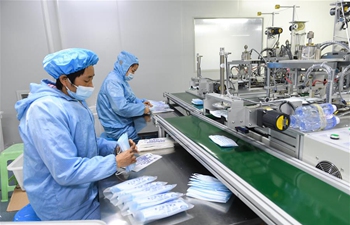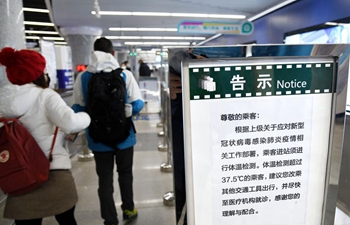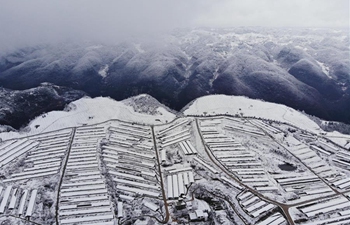by Dana Halawi
BEIRUT, Jan. 27 (Xinhua) -- Local economists agree on Lebanon's need to seek technical support from the International Monetary Fund (IMF) without resorting to financial help from the international organization.
Mounir Rached, president of the Lebanese Economic Association, told Xinhua that Lebanon does not qualify for financial support from the IMF because the central bank, according to its official balance sheet, has 30 billion U.S. dollars in foreign reserves and 15 billion dollars in gold.
"Meanwhile, the IMF usually comes to the aid of a country when the level of its reserves is equivalent to about six or seven months of imports. In Lebanon, we have reserves to import for several years," he said.
Rached said that the government can adopt a shadow program proposed by the IMF and the international organization can test the ability of the cabinet to implement such a program without offering any financing.
"In a shadow program, the IMF does not impose tough measures similar to those that are forced if the international organization is to offer financing as well," he explained.
Rached also advised the government to sell some of its gold by taking the parliament's approval while implementing measures that will be proposed by the International Monetary Fund.
Lebanon has been facing a deteriorating financial and economic situation caused by the failing policies of successive governments over the past 30 years.
The central bank's main policy focused on attracting dollar currency to the country by offering high interest rates on deposits in a bid to maintain a fixed exchange rate of the Lebanese pound to the U.S. dollar.
Meanwhile, successive governments failed to adopt policies that activate productive sectors such as agriculture and industry which should be the main drivers of the growth in the country.
This has led to an increase in public debt to 89.5 billion U.S. dollars in parallel to an increase in social demands.
The Lebanese, have on many occasions, voiced their concerns about such a move due to its heavy repercussions on citizens.
Independent economist Jassem Ajaka assures that any financial support by the IMF will have dire consequences on the citizens, because it will include an increase in taxes including the income tax and Value Added Tax, while removing subsidies on electricity, healthcare and diesel in addition to cutting public sector salaries by 40 percent.
"Such measures are very tough because they will lead to the impoverishment of people on the short term while the economic situation will improve on the long run," he said.
Ajaka agrees with Rached about Lebanon's need to seek technical guidance by the IMF only.
"There exist a lot of measures that can be taken to generate revenues for the cabinet, including the fight against corruption, tax evasion, in addition to adopting serious solutions to the electricity problem and shutting down some non-useful public institutions while restructuring the public sector," he said.

















